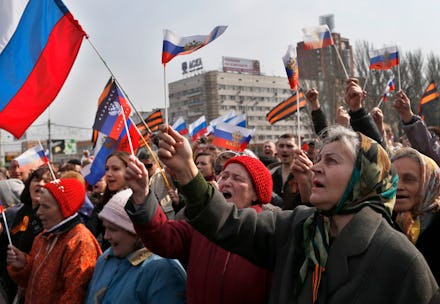93% Of People in Crimea Just Voted to Break Away From Ukraine

The news: It's official — the people of Crimea have voted to break away from Ukraine.
On Sunday, the Russian-speaking region held a referendum on whether it should distance itself from the new, pro-Western government in Kiev. From its population of 1.5 million, an overwhelming majority of voters came out to show their support for secession, as armed Russian troops guarded the polls. Reports cited over 93% of voters chose to join Russia. Turnout was estimated at 64%.
The ballot featured two questions: one on whether to gain autonomy from Ukraine, and one on whether Crimea should be annexed by Russia — there was no third option to support the status quo. On both questions, 99% of Crimeans voted yes, signifying an overwhelming divide from the rest of Ukraine. A reported 1% of voters discarded their ballots.
Image Credit: AP
Image Credit: AP
Is this legitimate? The referendum is mainly supported by Russia, which vetoed a UN Security Council draft resolution that criticized the move. There was no official international body monitoring the vote, although "a group of observers from 23 countries – a mixture of anti-Western ideologues and European far-right politicians" arrived on their own.
The rest of the international community has not been as accepting; every other Security Council member voted to refuse the validity of the referendum, with China abstaining. Even before the vote was counted, the White House announced that it was "administered under threats of violence and intimidation from a Russian military intervention that violates international law," and that the U.S. will not recognize the results.
The European Union has similarly condemned the vote as "illegal and illegitimate." It will hold a debate on Monday to impose sanctions against Russia for violating Ukraine's sovereignty; the U.S. is expected to support the move.
Ukraine's own government has also blasted the referendum's legitimacy, insisting that corrupt Crimean officials held the vote improperly. "The result has been pre-planned by the Kremlin as a formal justification to send in its troops and start a war that will destroy people's lives and the economic prospects for Crimea," said interim president Oleksandr Turchynov.
Image Credit: AP
Image Credit: AP
What will happen next? Just because the Crimean people want annexation does not mean that it will automatically take place. The Russian legislature will decide on Friday whether it wants to accept Crimea's proposal, and the full process may take up to a year. The streets of Moscow have been filled with competing rallies, with the public split on whether Crimea should be annexed.
Crimea's secession may also spark a similar move in other Russian-speaking regions of Ukraine. Anti-government rallies have already popped up in Odessa, Donestsk and Kharkiv, which also have significant ethnic Russian populations. With Crimea's precedent, more calls for secession may soon follow.
There is also the question of what will happen to the Tatars, an ethnic minority in Crimea that supports the Kiev government. The Tatars were forced out by Josef Stalin during World War II and were only able to return to Crimea in 1991. They now make up 12% of the Crimean population, and have no desire to return under Russian rule. Many Tatar protesters said they would boycott the referendum, along with ethnic Ukrainians.